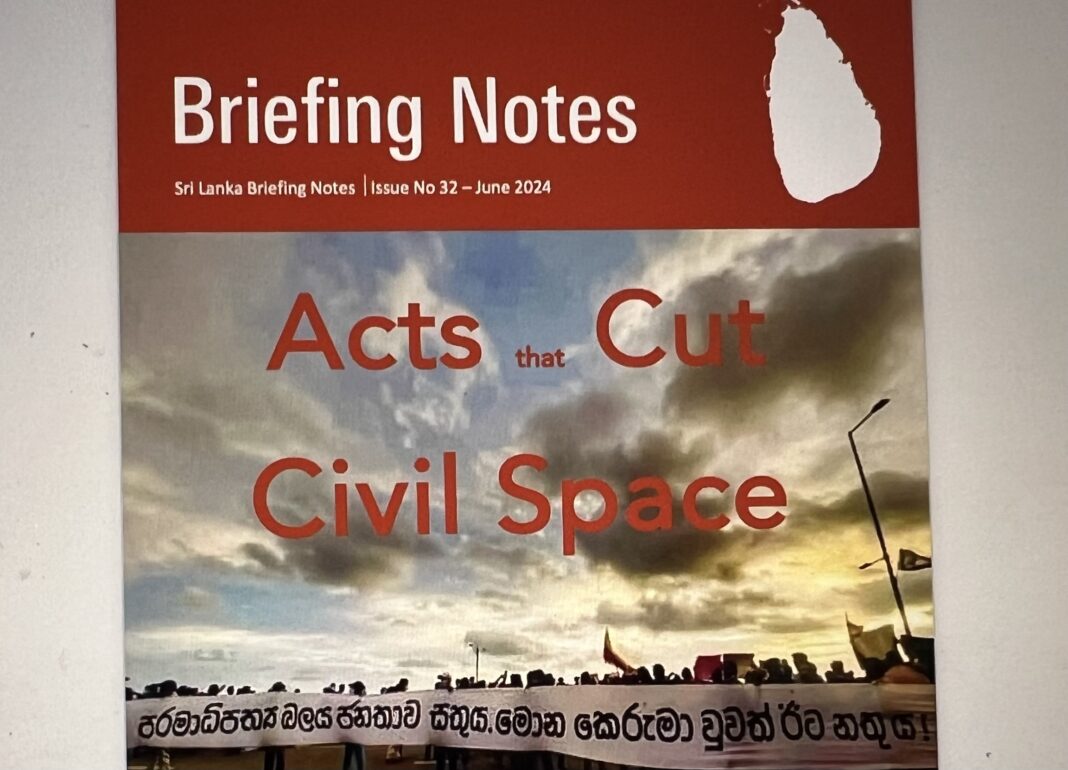Table of Contents
NGOs (Registration & Supervision) Act 11
Labour Law Reforms: Employment Bill 14
Broadcasting Authority Bill 18
The National Education Policy Framework. 20
Telecommunications (Amendment) Bill 21
Economic Transformation Bill 22
INTRODUCTION
Over the last two years, the Government of Sri Lanka has introduced several Acts that restrict and threaten civil space in the country. Some of them have been passed by the parliament and some of them are in the pipeline or gazetted. During the last few years ICCPR act which has been there since 2007 has been used to suppress free expression frequently.
Acts mentioned in this report and placed before the parliament have been challenged at the Supreme Court and SC has recommended far-reaching changes. If they were not challenged at the SC, these acts would have become the law of the country with serious erosion of the civil space and fundamental rights of the Sri Lankan people.
The government’s intention of bringing these acts is clear.
Civil space is crucial for the health and vitality of democracy and the protection of human rights. It refers to the public sphere where individuals and groups can freely express their opinions, engage in dialogue, organize, and participate in societal activities without fear of repression or discrimination.
“In short civil space is the political, legislative, social and economic environment which enables citizens to come together, share their interests and concerns and act to influence and shape their societies” |
Civil space allows for the free exchange of ideas and opinions. This freedom is essential for democracy as it enables citizens to voice their concerns, criticize government actions, and propose alternative policies. Without a free and open civil space, authoritarianism can thrive, stifling dissent and innovation.
In a vibrant civil space, individuals can engage in political activities such as voting, campaigning, and running for office. It provides a platform for civil society organizations (CSOs) to advocate for policy changes and hold public officials accountable, thus fostering a more responsive and representative government.
Civil space is integral to the promotion and protection of human rights. It allows human rights defenders to operate, report abuses, and mobilize support. When civil space is restricted, abuses often go unchallenged and unreported, leading to a deterioration in human rights conditions.
A robust civil space encourages dialogue among diverse groups, helping to bridge divides and foster mutual understanding. This is essential for social cohesion, as it allows different communities to collaborate on common issues and resolve conflicts peacefully.
Civil space promotes transparency by enabling journalists, activists, and watchdog organizations to investigate and report on government and corporate activities. This scrutiny is vital for combating corruption and ensuring that those in power act in the public interest
It provides a platform for marginalized and vulnerable groups to organize and advocate for their rights. This empowerment is critical for achieving social justice and ensuring that all segments of society can contribute to and benefit from democratic processes.
In summary, civil space is the bedrock of a healthy democracy and the protection of human rights. It enables free expression, political participation, and accountability, fostering a society where all individuals can contribute to and benefit from democratic governance and social justice. Without it, democratic institutions weaken, human rights are jeopardized, and societal progress stalls.
Read the full report as a PDF:Sri Lanka Briefing Notes No 32 June 2024 (1)
